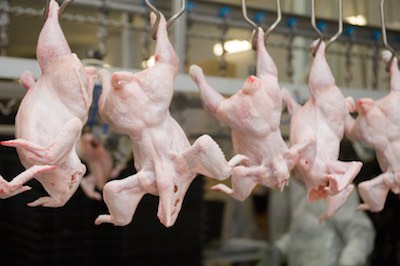Representatives from consumer advocate organizations met with staff from the White House Office of Management and Budget (OMB) yesterday to express their opposition to the poultry privatization rule that is close to being approved. The rule removes government inspectors from poultry slaughter lines, increases line speeds, and places company employees in inspection positions.
 Wenonah Hauter, executive director of Food & Water Watch said in a statement, “we expect the White House to jam this rule through quickly. Given the failure of the Obama Administration to implement policies to protect farmers from big meat packers, we suspect they are preparing to give another huge gift to the meat industry – the ability to police themselves when it comes to food safety.” The industry should gain $260,000,000 every year with this new rule.
Wenonah Hauter, executive director of Food & Water Watch said in a statement, “we expect the White House to jam this rule through quickly. Given the failure of the Obama Administration to implement policies to protect farmers from big meat packers, we suspect they are preparing to give another huge gift to the meat industry – the ability to police themselves when it comes to food safety.” The industry should gain $260,000,000 every year with this new rule.
The rule, known as HIMP, was proposed in January 2012, but it has been delayed because of strong opposition from food safety, worker safety, and animal welfare groups. USDA received more than 175,000 comments on the proposed rule, most of them opposed. Petitions have been sent to the USDA and government opposing the rule, and some members of Congress have petitioned the USDA to stop HIMP. The Government Accountability Office (GA) issued a report in August 2013 that questioned whether USDA had enough data to support the rule.
Contaminated poultry is already a huge problem in the United States. Chicken is routinely sold contaminated with Salmonella and other pathogenic bacteria. The Foster Farms Salmonella chicken outbreak, which has been ongoing since March 2013, has sickened at least 17,000 Americans. Almost 40% of those sickened have been hospitalized, since four of the seven strains of Salmonella Heidelberg in that chicken are resistant to multiple types of antibiotics.
Hauter continued, “I sincerely hope that the OMB staff listened to what was said today. The consumer group representatives left them with a considerable amount of documentation showing why the original ‘Filthy Chicken’ proposed rule was flawed. If USDA has substantially revised the proposed rule, then make its contents public now and have a new comment period. This is too important an issue to consumers to let USDA have the final say in how poultry is inspected, especially with all of the controversy that the original reckless proposal has generated.”




